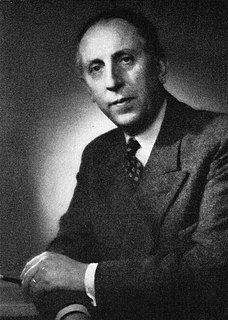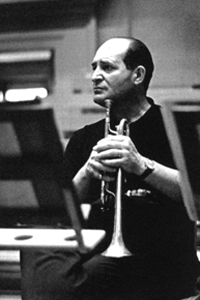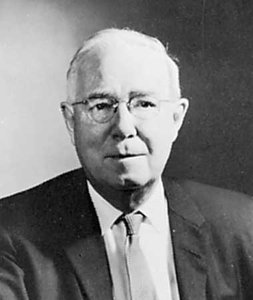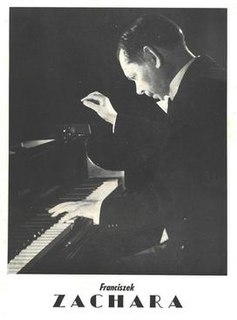
George Theophilus Walker was an American composer, pianist, and organist, and the first African American to win the Pulitzer Prize for Music, which he received for his work Lilacs in 1996.

Hilding Constantin Rosenberg was a Swedish composer and conductor. He is commonly regarded as the first Swedish modernist composer, and one of the most influential figures in 20th-century classical music in Sweden.
Samuel Hans Adler is an American composer, conductor, author, and professor. During the course of a professional career which ranges over six decades he has served as a faculty member at both the University of Rochester's Eastman School of Music and the Juilliard School. In addition, he is credited with founding and conducting the Seventh Army Symphony Orchestra which participated in the cultural diplomacy initiatives of the United States in Germany and throughout Europe in the aftermath of World War II. Adler's musical catalogue includes over 400 published compositions. He has been honored with several awards including Germany's Order of Merit – Officer's Cross.

Roger Louis Voisin was an American classical trumpeter. In 1959, The New York Times called him "one of the best-known trumpeters in this country."
Walter Sinclair Hartley was an American composer of contemporary (classical) music.

Leo Salkeld Sowerby was an American composer and church musician. He won the Pulitzer Prize for music in 1946 and was often called the “Dean of American church music” in the early to mid 20th century.
David Sartor is an American composer and conductor of symphonic, chamber, and choral music. He is on the music faculties of Belmont University, Cumberland University and Trevecca Nazarene University, and is the founder and music director of the Parthenon Chamber Orchestra.

Eric Ewazen is an American composer and teacher.

Gail Thompson Kubik was an American composer, music director, violinist, and teacher.
John Diercks was an American composer born in Montclair, New Jersey, in 1927. He held degrees from Oberlin College, the Eastman School, and the University of Rochester (PhD). His composition teachers included Howard Hanson and Alan Hovhaness. For Asian music and dance he studied with Dorothy Kahananui and Halla Huhm.
Philip Thomas Bezanson was an American composer and educator.
David Wynne was a prolific Welsh composer, who taught for many years at Cardiff University and wrote much of his best-known music in retirement.

Franciszek Zachara was a Polish pianist and composer who concertized extensively throughout Europe in the years leading up to 1928. He was a professor of piano at a Polish conservatory from 1922–1928, and two American colleges from around this time until his death in 1966. Zachara composed well over 150 works, including many works for piano solo, a piano concerto, a symphony, several works for band, and various chamber pieces. The archive of his manuscripts is held at the Warren D. Allen Music Library at Florida State University. Most of these manuscripts are originals from the composer's own hand.
John H. Davison was an American composer and pianist.
Emma Lou Diemer is an American composer.
John W. Downey was a contemporary classical composer, conductor, pianist and educator. His works have been performed extensively in Western and Eastern Europe, South America, Australia, Africa, the Middle East, Israel, Asia, Mexico and Canada, as well as throughout the United States.
Martin Amlin is an American composer and pianist. He was born in Dallas, Texas.

Ronald Montague Barnes was an American carillonist, composer, and musicologist. He first began playing the carillon as a teenager at his hometown's church. In 1952, at 24 years old, he was appointed to play the carillon at the University of Kansas, where he developed as a musician. He was later the carillonist for the Washington National Cathedral from 1963 to 1975 and the University of California, Berkeley, from 1982 until his retirement in 1995. He was an involved member of The Guild of Carillonneurs in North America, having served as its president, vice president, and several other roles.
Leone Buyse is the Joseph and Ida K. Mullen Professor of Flute and Chair of Woodwinds at Rice University's Shepherd School of Music. Prior to a full-time career teaching, Buyse spent over 22 years as an orchestral flutist, including a decade from 1983-1993 as Principal Flute of the Boston Symphony Orchestra and Boston Pops Orchestra. Other orchestral positions include Rochester Philharmonic as solo piccolo and second flute, and assistant principal of San Francisco Symphony. In addition to the Shepherd School, she has held faculty positions at the New England Conservatory, Boston University, University of Michigan, as visiting professor at the Eastman School of Music and numerous summer festivals including the Tanglewood Institute. Her primary teachers include Marcel Moyse, Jean-Pierre Rampal, Michel Debost and Joseph Mariano.
Norma Ruth Wendelburg was an American composer, Fulbright scholar, pianist and teacher.








